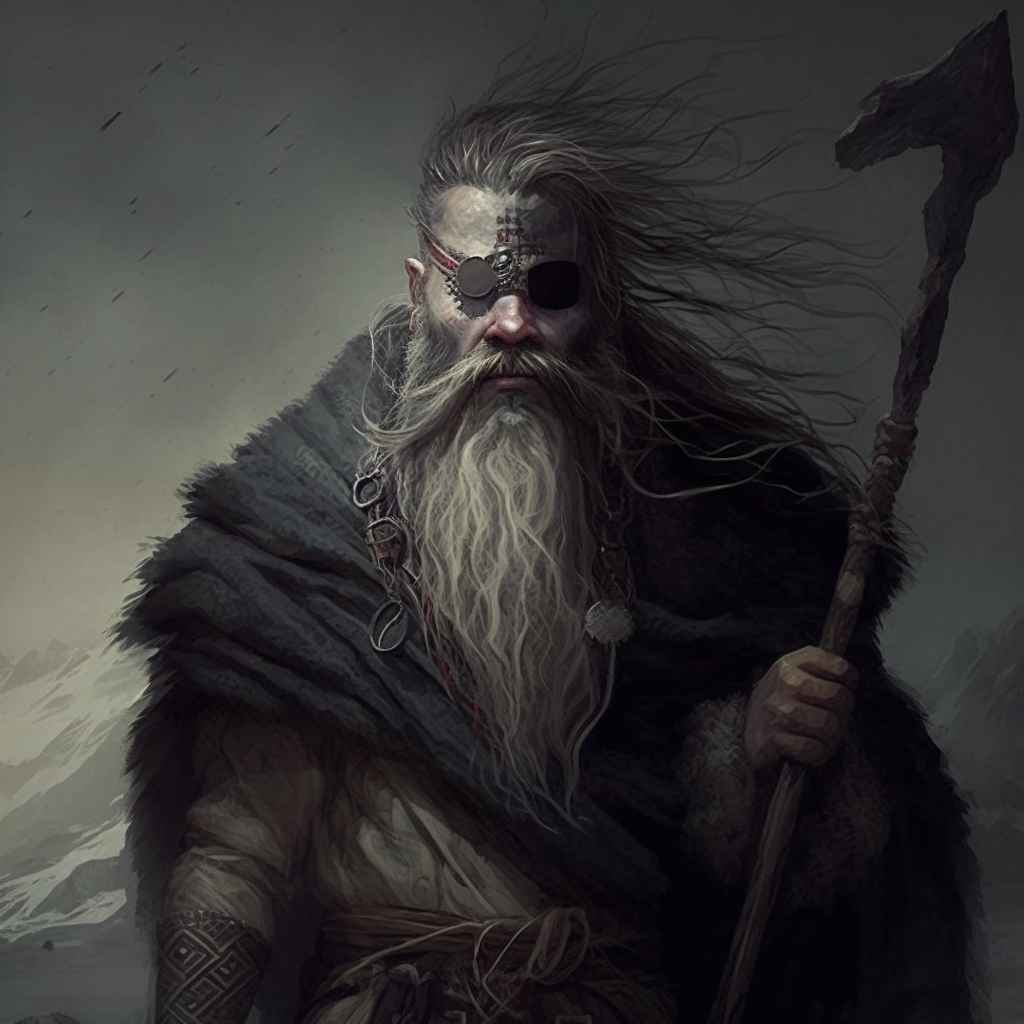God, Höðr, “God of Winter, Cold and Darkness”
Höðr is a blind god in Norse mythology who unintentionally kills his brother Baldr with a mistletoe dart.

- Pantheon: Norse mythology
- Deity Title: God of Winter, Cold and Darkness
- Deity Symbol: A spear or a blindfold
- Home Plane: Asgard
- Deity Level: One of the Aesir
- Alignment: Chaotic Neutral
- Aliases: Hoder, Hodr, Hod
- Superior: Odin
- Traditional Allies: Balder, Frigg
- Traditional Foes: Loki
- Divine Artifact: None specified
- Servants: Frost giants, winter wolves, undead creatures
- Servitor Creatures: Ice elementals, shadow creatures
- Sacred Animal: A white stag, symbolizing the fleetingness of life and the pursuit of fate
- Manifestations: A sudden drop in temperature, snow or frost forming in the vicinity, the sound of a horn being blown in the distance
- Signs of Favor: A mild winter, a successful hunt or fishing expedition, a sudden burst of insight or intuition
- Worshipers: Hunters, fishermen, farmers, soldiers, seafarers, those seeking guidance in matters of fate and destiny
- Cleric Alignments: Lawful Neutral, True Neutral, Chaotic Neutral
- Specialty Priests: Runecasters, who specialize in divination and prophecy using the runes Holy Days: The winter solstice, the anniversary of Balder’s death, the day of the first snowfall of the year
- Holy Days: None specified
- Portfolio: Winter, Cold, Darkness, Death, Fate
- Domains: Death, Darkness, Fate, Winter
- Favored Weapon: Staff
- Favored Class: Cleric
- Favored Race: Humans, half-elves, dwarves
- Duties of the Priesthood: Conduct funerary rites, offer sacrifices to ensure a good harvest and protect against cold and famine, study the runes for divination and prophecy
- Major Cult/Temple Sites: A temple in the frozen north, where Höðr is worshipped as the lord of winter and darkness
- Benefits: Ability to create and control snow and ice, enhanced cold resistance and survival skills, ability to see in darkness and detect hidden things, increased intuition and foresight.
Höðr is a blind god in Norse mythology who is often remembered for the tragic role he played in the death of his brother Baldr. Born to the god Odin and his wife Frigg, Höðr’s blindness sets him apart from the other gods, leaving him feeling isolated and insecure.
Despite his disability, Höðr possesses immense strength and courage, which he demonstrates on the battlefield. However, he struggles to find his place in the world and longs for acceptance from his fellow gods.
When the goddess Frigg makes all objects in the world swear not to harm her son Baldr, Höðr is left out of the ceremony due to his blindness. Loki, the mischievous god, discovers that mistletoe was not included in the oath and crafts a dart from the plant, which he gives to Höðr. Unaware of the true nature of the dart, Höðr throws it at his brother during a game of gods, tragically killing him.
Höðr is consumed with grief and guilt over what he has done, leading him to withdraw even further from the other gods. However, in some versions of the myth, Höðr is eventually redeemed and forgiven by his fellow gods, who come to understand that he was an unwitting pawn in Loki’s scheme.
Despite his tragic role in the death of Baldr, Höðr remains a complex and compelling character in Norse mythology. His struggle with his disability and his longing for acceptance make him a relatable figure, while his tragic fate serves as a reminder of the dangers of unchecked ambition and the importance of forgiveness.
Currently
In the year 1450, Höðr, finds himself wandering the earth in search of a new purpose. No longer revered as a deity by the people, Höðr feels disconnected from the world and struggles to find meaning in his existence.
As he travels across the countryside, Höðr observes the many changes that have taken place since the days of the Vikings. The world has become more complex and interconnected, with new technologies and ideas spreading across the continents.
Despite his blindness, Höðr’s other senses are keenly attuned to the world around him. He can hear the hum of machines, the chatter of people in multiple languages, and the clanging of swords and armor from distant wars.
While he is no longer worshiped as a god, Höðr still holds onto his belief in the power of strength and courage. He sees the many conflicts and struggles of the world and feels compelled to help in whatever way he can.
One day, Höðr comes across a group of travelers who have been robbed and left stranded on the side of the road. Without hesitation, he steps in to defend them from their attackers, using his formidable strength and skill to overpower the bandits.
Moved by Höðr’s bravery and selflessness, the travelers offer to take him in and provide him with a new purpose. They are part of a growing movement that seeks to bring peace and prosperity to the world through commerce and diplomacy, rather than war and conquest.
Höðr is intrigued by their vision and decides to join them on their journey. He sees in their cause a chance to use his own skills and experience to help create a better world for all people.
As they travel together, Höðr finds new meaning in his life and a sense of purpose that he thought was lost forever. While he may no longer be a god, he has found a new way to serve the world and make a difference in the lives of those around him.

 Buy me a coffee
Buy me a coffee